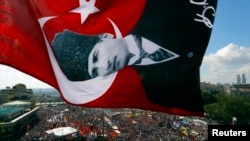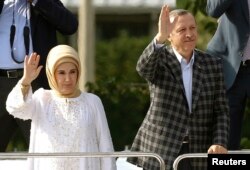ISTANBUL —
In a series of speeches condemning ongoing unrest, Turkish Prime Minister Recep Tayyip Erdogan has evoked memories of previous secular-based protests against his government - protests that were strongly backed by pro-army groups. But analysts say this latest unrest appears more civic based with youth protesting for individual freedom.
Gezi Park in Istanbul is the eye of a political storm that is raging across the country.
What began as a protest to save the park from being demolished has galvanized the protesters around the country who are criticizing the prime minister's governance, which protesters say is increasingly authoritarian.
One demonstrator, Ayse, who works as a librarian, said, "Everything started from many things. It was first you can't kiss on the street. You can't drink. He is changing the education. He is not asking, "do I really want my child to be happy?" instead of thinking if she has to go religious school. So it means that he will do anything he wants to do. It's like clapping hands. Change this! Cut this! You also you have to listen to these people as well."
Observers say the protest movement appears to be made up of Turkey's largely apolitical young middle class.
In the center of the protest park, Ihsan Eliacik holds Friday noon prayers. Surrounded by TV cameras, 100 faithful prayed under the baking sun. Eliacik, who heads a left-Islamic civil rights group, said this protest is heralding a new Turkey.
He said they completed Friday prayers in Gezi Park a day after celebrating an Islamic holy night there. He said no one drank a sip of alcohol that night. He said women in headscarves walk freely in the park. Eliacik adds that the social division in Turkey is between those who exploit power versus the rest of society.
It's not the first the time Mr. Erdogan has faced mass protests.
A decade ago, hundred of thousands mobilized in support of secularism, carrying flags and banners showing secular state founder Mustafa Kemal Ataturk. There were calls for the pro-secular military to intervene against changes pushed by the Islamist-rooted government.
But analysts say the current unrest appears different. There have been no military demands and images of Ataturk are few in Gezi Park.
Analyst Istar Gozaydin of Dogus University has devoted much of her academic life to the battle between Islam and secularism and said this latest unrest is very different.
"These groups are not relying on prior ancien [old] regime supported by the military. This is more of personal freedoms, more personal lifestyle. They have the common point of not being able to cope with the single lifestyle that the current government is trying to impose," Gozaydin said.
"However," Gozaydin added, "just being religious believers has not made them a target by the uprising groups. It's not this polarization of believers - non-believers or whatever, secularists and Islamist, kind of thing. That is a very significant change in society."
On Sunday, Mr. Erdogan toured the country addressing a series of mass meetings of his supporters. He warned protesters. He said Turkish officials are going to show patience, but warned that patience has a limit. He said the time of coups is over, alluding to past interventions by the Turkish military.
Analyst Gozaydin said the current protest movement offers Turkey a chance at improving social dialogue.
"These processes that have been taking place seem to be leading to another understanding; that different understandings, different approaches, different lifestyles are able to exist together," Gozaydin said. "If that happens to be achieved, that means a long way has been taken in this path to a democratic society."
But Monday, there were renewed clashes between protesters and security forces in the capital, Ankara. And the head of the opposition Republican People's Party, Kemal Kilicdaroglu, accused the prime minister of escalating tensions and dragging the country "into the fire."
Analysts predict that the current unrest shows little sign of abating.
Gezi Park in Istanbul is the eye of a political storm that is raging across the country.
What began as a protest to save the park from being demolished has galvanized the protesters around the country who are criticizing the prime minister's governance, which protesters say is increasingly authoritarian.
One demonstrator, Ayse, who works as a librarian, said, "Everything started from many things. It was first you can't kiss on the street. You can't drink. He is changing the education. He is not asking, "do I really want my child to be happy?" instead of thinking if she has to go religious school. So it means that he will do anything he wants to do. It's like clapping hands. Change this! Cut this! You also you have to listen to these people as well."
Observers say the protest movement appears to be made up of Turkey's largely apolitical young middle class.
In the center of the protest park, Ihsan Eliacik holds Friday noon prayers. Surrounded by TV cameras, 100 faithful prayed under the baking sun. Eliacik, who heads a left-Islamic civil rights group, said this protest is heralding a new Turkey.
He said they completed Friday prayers in Gezi Park a day after celebrating an Islamic holy night there. He said no one drank a sip of alcohol that night. He said women in headscarves walk freely in the park. Eliacik adds that the social division in Turkey is between those who exploit power versus the rest of society.
It's not the first the time Mr. Erdogan has faced mass protests.
A decade ago, hundred of thousands mobilized in support of secularism, carrying flags and banners showing secular state founder Mustafa Kemal Ataturk. There were calls for the pro-secular military to intervene against changes pushed by the Islamist-rooted government.
But analysts say the current unrest appears different. There have been no military demands and images of Ataturk are few in Gezi Park.
Analyst Istar Gozaydin of Dogus University has devoted much of her academic life to the battle between Islam and secularism and said this latest unrest is very different.
"These groups are not relying on prior ancien [old] regime supported by the military. This is more of personal freedoms, more personal lifestyle. They have the common point of not being able to cope with the single lifestyle that the current government is trying to impose," Gozaydin said.
"However," Gozaydin added, "just being religious believers has not made them a target by the uprising groups. It's not this polarization of believers - non-believers or whatever, secularists and Islamist, kind of thing. That is a very significant change in society."
On Sunday, Mr. Erdogan toured the country addressing a series of mass meetings of his supporters. He warned protesters. He said Turkish officials are going to show patience, but warned that patience has a limit. He said the time of coups is over, alluding to past interventions by the Turkish military.
Analyst Gozaydin said the current protest movement offers Turkey a chance at improving social dialogue.
"These processes that have been taking place seem to be leading to another understanding; that different understandings, different approaches, different lifestyles are able to exist together," Gozaydin said. "If that happens to be achieved, that means a long way has been taken in this path to a democratic society."
But Monday, there were renewed clashes between protesters and security forces in the capital, Ankara. And the head of the opposition Republican People's Party, Kemal Kilicdaroglu, accused the prime minister of escalating tensions and dragging the country "into the fire."
Analysts predict that the current unrest shows little sign of abating.





